From celebrities like Marylin Monroe, Amber Heard, and even Princess Diana it is clear that society is fascinated by female trauma. Arguably, this fascination has turned into a form of “pain porn” where female suffering is glorified rather than understood, reduced to a form of mass entertainment, and something that is capitalized on. It is evident that “pain porn” only furthers the power and status of the men who inflict it on these women, as ultimately, it is these men who profit from the exploitation of trauma. Worst of all, these men often evade the legal or social consequences of their actions, as they are protected by the corporations that they are attached to and how they are perceived by the public.
In 2018, Amber Heard wrote an op-ed for the Washington Post detailing her experience of being harassed and abused as a young woman and how the institutions around her protected the men that perpetrated this abuse. She became a leading voice in the #MeToo movement, becoming a public figure chosen by the ACLU to represent domestic abuse. It was after this that she experienced the extent that both public opinion and institutions would take to protect the men who she claimed had participated in her abuse. She was later sued by Johnny Depp, her former partner, for defamation over a line in the article where she stated that she was a “public figure representing domestic abuse.”
While there could be a whole discourse around whether or not she was the abuser, or if the relationship was “mutually abusive,” what is clear is that Depp is 23 years her senior, significantly more famous, and for the majority of their relationship, made more money. Out of the two of them, it is clear that he had substantially more power. Further, during the UK libel trial, the court found Depp to be the perpetrator and aggressor, something that is challenging to prove, especially in the UK where courts are known for being more plaintiff-friendly. It was no doubt a traumatic event for both parties, and abuse was perpetuated and sustained on both sides. That being said, it is clear that Amber Heard sustained a majority of the consequences both socially and financially.
The 2022 trial was sensationalised, with many people hosting viewing parties to watch the proceedings, viewing this woman’s emotional pain as entertainment. Yet her pain was further exploited by the many companies and individuals who profited from it. Depp was awarded $15 million in punitive damages due to defamation, and aside from the entities who profited from merchandise made for the trial, content creators on platforms such as TikTok and YouTube made money spreading false allegations about Heard by taking clips from the trial out of context. Not to mention, Heard’s role as Mera in Aquaman was recast by Warner Brothers, exercising how institutions use their power to leave victims vulnerable and powerless.
Depp, on the other hand, was only ordered to pay $2 million in damages, facing limited legal ramifications for his actions. Furthermore, since the trial, he has been able to obtain high-paying advertising contracts with brands like Dior.
This pattern is also present in the recent dispute between Angelina Jolie and Brad Pitt. The dissolution of their highly-public marriage was brought on after the FBI conducted an investigation into evidence of domestic abuse. The report obtained by the New York Times describes how Pitt grabbed Jolie by the shoulders and shook her before pushing her into the bathroom wall. While the abuse escalated during a private flight from France to the United States, and ended when Pitt choked one of their children and struck another in the face, who were not named for legal reasons, pouring both beer and red wine onto them.
Despite this being a documented investigation conducted by the FBI, the tabloids exploited the trauma in the name of entertainment. NBC launched an investigation into this issue after discovering 12 YouTube channels that made direct comparisons between Jolie and Heard in video thumbnails hours after the Times‘ article was published in October. The investigation showed how quickly individuals seek to profit from celebrity pain, which is only incentivized by the scaling of views for such content and the advertising money that comes with it. This does not take the court of public opinion into consideration, where individuals on Twitter deemed Jolie deserving of the incident, judging her on her former “wild child” reputation. In contrast, Pitt has not been reprimanded for working with Harvey Weinstein, a convicted abuser, on two projects despite being aware of Weinstein’s reputation. Not to mention there has been limited discourse online regarding these abuse allegations, seen by his intact professional reputation as he is still able to obtain acting roles like in Tarantino’s Once Upon a Time in Hollywood, showing little impact on his public perception.
Society’s fascination with women’s pain is not limited to the living. The recent Netflix movie Blonde directed by Andrew Dominik is a two-hour and 46-minute horror flick that essentially reduces the life of Marylin Monroe into a fetishized porno of trauma and heartbreak. The film focuses only on the physical and emotional pain Monroe endured through many miscarriages, sexual assaults, and her exploitation in Hollywood, leaving viewers to question the intentions behind the movie. It superficially relays her trauma, consciously not acknowledging her psyche behind the experiences. The issue here isn’t that the film references her trauma, instead, it is that it reduces her life down to these moments, suggesting she wasn’t a strong and capable woman with interests outside of her abuse. The fictional nature of this movie furthers this misconception as it only works to diminish her real-life experiences and accomplishments, reducing her to a shell of a woman who is exploited beyond the grave to line the pockets of the men behind its production.
The reality of this situation is women today are afraid to speak up about their abuse in fear of not being believed, despite false allegations representing less than six percent of all reported abuse claims. It is especially problematic when even women with power and influence like Jolie and Heard are treated with limited credibility. It leaves regular women asking if society is willing to discredit these women, despite their evidence, resources and public influence, why would anyone believe them? In Jaclyn Friedman’s article for the Guardian, she writes that “women’s pain is expected, part of the wallpaper of life” as we live in a culture that views female pain as normal, and male pleasure as a right. But if we continue to re-exploit women in the way we tell their stories, we only perpetuate the idea that women do not deserve the respect we willingly grant powerful men.






























